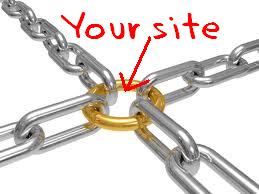 Linking is what connects all the pages on the Internet. You have links in your website to let people navigate their way around. You may have links to other websites that you think will be useful to your visitors, and hopefully you have links coming to your site from relevant content.
Linking is what connects all the pages on the Internet. You have links in your website to let people navigate their way around. You may have links to other websites that you think will be useful to your visitors, and hopefully you have links coming to your site from relevant content.
All types of links can impact your search engine optimization results, helping determine where your website shows up online. Though the hardest to control, inbound links pointing to your site can make the biggest impact.
At its most basic, the concept is that if several high-quality sites are linking to your web site, then Google and other search engines figure your site must be popular with valuable content, and you have a better chance at achieving higher search engine rankings. The result is that you have higher quality links from other sites. This is an ongoing process, you never want to work this marketing strategy for a month then stop. The Google PageRank algorithm looks at the pattern of links to your site as they build over time.
Building the right kind of links can bring a major payoff, while a wrong turn could get you penalized. Trying to dig out of the Google Sandbox is not easy.
Armed with a bit of knowledge and some creativity, you can build up valuable incoming links naturally and powerfully, avoiding the traps that plague amateurs.
Spice Up Your Links With Some Variety
There are all kinds of link farming schemes to grow links, and you need to run the other way from these. This is also called reciprocal linking, where you exchange links with other web sites that will then link to you on a mass scale. Warning: Google is onto this.
While it’s perfectly advantageous to link to high-quality sites that also link to you, the key here is to cultivate a natural mix of links over time.
Is it natural to suddenly have 100 links pointing to your site, all with the same text? Of course not. When people link to you naturally, they might use your business name (SEO Advantage) or some variation on a descriptive phrase (search optimization company). If too many similar links exist, it can signal that those links were generated artificially and potentially result in penalties.
Also consider which pages on your site inbound links point to. Your home page is probably going to get the most, but it’s natural to have links pointing to specific pages inside your web site, too. Cultivate links to your services, your blog, your news pages, your articles, etc., to help those pages get indexed and build their own PageRank. Called deep links, these can help bolster your site’s overall performance.
Some links also carry a title tag, which is indicated in the source code. This is a little too technical to go into detail here, but if you can influence this you’ll want both the link text and title to vary a bit among the links pointing to your site. Once again, the key is to grow your links in a natural pattern.
Not Every Link Carries The Same Value
Links from popular, established web sites usually carry the greatest value. That’s because they have high PageRank from plenty of other people already linking to them. A link from CNN.com, for example, will carry much more weight than a link from a free press release distribution site that few people know of. Likewise, a link from www.sbdpro.com will have a greater impact than a link from a directory that uses no-follow tags.
No-follow tags are the bane of naive link builders. It’s tempting to think you can just link to pages on your site from your Twitter tweets, Facebook and other social media applications. However, many of these sites as well as online ads and also some directories employ “no follow” tags that prevent the search engines from following a link to your site. In this case, it’s as if the link doesn’t exist in the eyes of the search engines. (That doesn’t mean the links aren’t valuable to people who find you and follow the link, it’s just not helping your web site show up in Google.)
So, How Can A Business Build Incoming Links Naturally?
The mix of links created out on the web pointing back at your web site should avoid skewing toward any particular type. A good mix that you can influence may include:
• Directories – Professional organizations, online communities and forums, business directories, etc. can all potentially provide good links to your site. There are several premium directories that are staples in an SEO firm’s link building toolkit, like DMOZ.org. Keep in mind that your listing itself should be optimized in order to reap the full link juice benefits.
• Press Releases – Writing and submitting press releases online can help you get your news in front of more people and build links to your site. (Be sure to use best practices for writing and evaluate carefully your outlets for good links).
• Blogs – Link to relevant pages on your site from your blog. Build relationships online with other bloggers, too, and they may want to link back to you! Active blogs with high visibility and large followings are going to be your best bet, but you can mix it up over time targeting lesser known bloggers, too. Keep in mind that as other sites grow in PageRank, the value passed to your site will also grow.
• Create Some Link Bait – Make sure your content is so fascinating or funny that people will want to tell others about it. This is the ultimate for building naturally growing incoming links but of course hard to do.
A sample schedule could mean every month you list your site in two good directories, link to interior site pages from a couple relevant posts in your blog, distribute one press release to news sites, and write one great article that other people may want to link to and then let them know about it.
A word about selecting outlets is in order, too. You’ll need to carefully assess each place you target in order to determine the link value they can pass onto you. For example, different press release submission sites and directories can give you a wide variety in link value. This can be time-consuming to determine but worth it when your site’s PageRank starts to climb.









